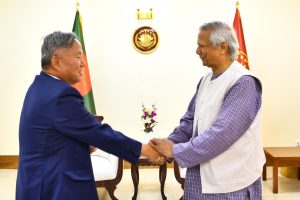Often overshadowed by its larger neighbors, Bangladesh is quietly positioning itself as a strategic economic power by attracting foreign direct investment (FDI).
China, Bangladesh’s largest trading partner, currently leads the charge with regard to investing in the country. It has announced plans to invest in two new special economic zones tailored for Chinese investors in manufacturing products such as textiles, ceramics, and renewable energy.
However, South Korea’s growing footprint in Bangladesh signals a greater strategic alignment that leverages Bangladesh’s aspiration for digital transformation and both countries’ desire for economic growth.
With investments totaling around $1.56 billion, South Korea is currently ranked as Bangladesh’s third-largest source of FDI. Its ranking has been improving year-on-year since 2023. This upward trend highlights Bangladesh’s increasing appeal to South Korean investors.
Political Challenges Amid Economic Potential
Protests and unrest in 2024 led to the resignation of Bangladesh’s longtime Prime Minister Sheikh Hasina and the appointment of Nobel laureate Muhammad Yunus as head of a caretaker government. While this political upheaval initially triggered hesitation among foreign investors, the subsequent promise of reforms under Yunus’ government has resulted in renewed interest in the country, as evident from the near-2,500 participants in Bangladesh’s Investment Summit 2025.
Assuming Bangladesh sustains its current reform-minded trajectory, it will present a compelling value proposition for foreign capital, particularly from South Korea. Bangladesh’s strategic location, young population, and growing economic potential continue to stand out despite its political challenges, with a focus on sectors like technology, renewable energy, and infrastructure.
South Korean Investments in Bangladesh’s Emerging Sectors
South Korean investors have made significant inroads into Bangladesh’s manufacturing and renewable industries, as well as emerging sectors like semiconductors and digital electronics. This diversification reflects a strategic move by Korean firms to tap into Bangladesh’s evolving industrial landscape and growing consumer market.
Recent developments underscore these trends. In April 2025, a delegation of Korean investors, including officials from LG, visited Bangladesh’s Korean Export Processing Zone (KEPZ) in Chattogram. The KEPZ is a flagship economic zone hosting manufacturing and green energy production facilities. Notably, manufacturing conglomerate Youngone formalized investments in KEPZ’s textile and solar energy facilities. Just one month earlier, in March 2025, Hyundai announced a partnership with DX Group to enter the Bangladeshi market for consumer electronics and appliances. Similarly, Samsung has been working with Bangladesh’s Fair Group to manufacture electronics, including mobile phones, televisions, and air conditioners.
These ventures signal Korea’s growing footprint in Bangladesh in manufacturing, technology, and other industries, signaling a long-term commitment to the country’s economic development.
Bilateral Innovation Supporting Bangladesh’s Growth
Both the South Korean and Bangladeshi governments have been supportive of the startup ecosystem in Bangladesh. This can be seen through initiatives like the 2023 launch of a virtual desk platform in Bangladesh’s embassy in Korea to attract IT-specific FDI to Bangladesh, as well as a joint effort between Bangladesh’s ICT Division and the Korea Productivity Center to establish a mentoring initiative aimed at facilitating startup growth in Bangladesh. Official collaborations within other sectors, including healthcare, and the establishment of cross-border governmental standards, underscore the commitment of both governments to bilateral economic growth.
These supportive governance frameworks have spurred the growth of cross-border startup ventures. One example is the Korean-founded food-tech startup, MFM Korea, which provides job opportunities for Bangladeshi women through resource recycling. Similarly, Chardike, a Bangladesh-created Korean products platform, highlights this organic interest in cross-border startup development.
Beyond just startups, established enterprises are also leveraging the power of cross-border partnerships. In April 2025, Global Brand PLC, a Bangladesh-based IT product distributor, and Hyosung TNS, a Korean-based fintech provider, announced a partnership to modernize Bangladesh’s banking infrastructure. Previously, South Korean giant Woori Bank also entered into partnerships with digital wallet startup bKash and Bankcomparebd, a Bangladesh product recommendation site.
Unlocking Future Growth
Bangladesh’s economic evolution extends beyond its manufacturing roots, with its desire to transform into a digital economy presenting opportunities for South Korean and Bangladeshi startups alike, with key use-cases to include digital payments, e-commerce, and smart city infrastructure.
A prime example of these synergies is Mirsharai, located in southeast Bangladesh, which is being developed into a National Special Economic Zone (NSEC) with a smart city emphasis by leveraging South Korea’s expertise in smart city development. South Korea envisions transforming Mirsharai by 2028, drawing inspiration from successful coastal cities like Ulsan and Shenzhen, which have grown into significant industrial hubs and economic drivers. Key special economic zones like Mirsharai offer significant potential for startups and large enterprises alike. The relative proximity to both Chittagong’s seaport and airport enables the city to be a self-sustaining digital ecosystem, with parallel growth tracks in both traditional goods and digital services.
This example highlights just how important it will be for Bangladesh to leverage its digital economy alongside its manufacturing-based one. Therefore, it is key for Bangladesh to partner with Korean startups and enterprises alike to fully ensure economic growth and digital modernization.
Conclusion
In an increasingly complex and interconnected Indo-Pacific, Bangladesh is emerging as a dynamic and strategic partner, poised to play a significant role in Asia’s next growth narrative. By leveraging its robust population, strategic geographic location, and a clear vision for digital transformation, Bangladesh is positioning itself as a transformative hub. For South Korea, deepening this engagement offers a vital opportunity to diversify its regional economic strategy, foster innovation, and contribute to the stability and prosperity of a crucial South Asian nation.
This burgeoning partnership between Seoul and Dhaka exemplifies a mutually beneficial relationship that transcends trade, pointing toward a future of shared economic progress and strategic alignment in the Indo-Pacific.
The views expressed in this article are personal. It does not contain information of an official nature, nor does the content represent the official position of any government, organization, or group.

































